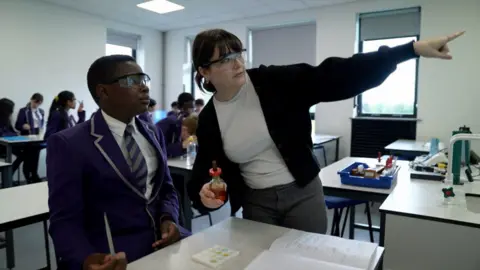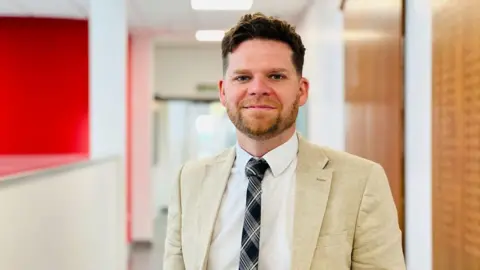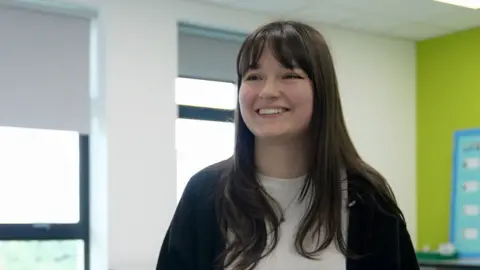School strikes 'now unlikely' after 5.5% pay offer
 BBC
BBCMore school strikes in England are "now unlikely", teaching unions have said, as they welcomed the government's offer of a 5.5% pay rise from September.
The offer is being funded by an additional £1.2bn from the government.
The National Education Union (NEU) called it a “welcome step in the right direction”.
Others called it a "positive start", but said further work would need to be done to restore wages after a real-terms cut since 2010.
That is because teachers' pay has fallen in value since then when compared with the increased cost of living.
The independent Institute for Fiscal Studies says the average teacher's pay is 6% lower in real terms now than it was 14 years ago, and is no higher in value than it was in 2001.
Experienced teachers have taken the brunt of that, with a real-terms reduction of 11% since 2010.
In contrast, average earnings are due to be about 6% higher in 2024 than in 2010, and about 18% higher than in 2001.
A report by the independent pay review body said a 5.5% pay rise for teachers would “represent taxpayer value for money”, saying there are now shortages of teachers in all but three secondary school subjects.
Daniel Kebede, general secretary of the NEU, says the "fully funded" pay award signals a "change in direction".
While it is not a "correction" in pay, he says it is "one step on the road" towards it.
Many schools in England had already budgeted for pay increases of about 3% from September. The £1.2bn being promised by the government is intended to top that up to the 5.5% offer.
Where will the money come from?
As well as increased spending on public sector pay, the government has also announced a number of cuts to afford it.
That includes the Advanced British Standard qualification introduced by former prime minister Rishi Sunak.
He said the new qualification would combine A-levels with vocational T-levels and would involve mandatory teaching of maths up to the age of 18.
The previous government had said it would spend £600m over two years for the initial work on the now-scrapped qualification.
Chancellor Rachel Reeves told the Commons on Monday the cost of the proposal "rises to billions" in future years and if the government cannot afford it, they will not pay for it.
Mr Kebede said the new pay offer would probably be put to NEU members in a formal ballot in September, but said more school strikes are now unlikely to happen.
Teachers across the UK went on strike last year, including eight days by members of the NEU in England.
The industrial action only ended when they and three other top teaching unions accepted a 6.5% pay rise last July.
As well as averting strike action, Ms Reeves and her colleagues in government will hope the pay offer can help tackle the crisis in recruiting and retaining teachers.
Noel Kennedy, principal at Thistley Hough Academy in Stoke, says he has previously lost sleep over recruiting enough staff.

He says improved pay is "crucial" to finding and keeping specialised teachers in the profession.
"People want to be paid for an honest day's work and if the pay isn't equivalent to the effort and the hard work that they're having to put in, then it's tricky," he says.
He says the school advertised for a science teacher vacancy twice last year, and both times received no applications.
Instead, they have had to reach as far as Canada to find someone to fill the role.
That person, Alison Turner, says she was initially worried about being able to get a job as a new graduate, but was told by a recruitment agency that UK schools would "welcome her with open arms".

Teachers in subjects like science and maths have been hard to find for many schools struggling to recruit and retain teachers.
She says she has "lucked out" by living in Stoke because of the "astronomical" difference with the cost of living that some overseas teachers have to endure in London.
Even so, she feels "very, very lucky" to be a "young, unmarried graduate with no children" as that is the lifestyle her pay supports.
Colleagues supporting families with their pay "are fantastic at making limited resources work", she says, "but it's just a stress they shouldn't have".
As well as the announcements on pay, the Treasury has also confirmed that VAT at the standard rate of 20% will be added to private school fees from 1 January 2025.
Labour has pledged to use the money raised to recruit 6,500 new teachers.
Additional reporting by Hope Rhodes.
